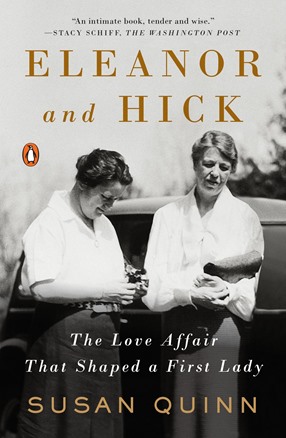Description
A warm, intimate account of the love between Eleanor Roosevelt and reporter Lorena Hickok—a relationship that, over more than three decades, transformed both women's lives and empowered them to play significant roles in one of the most tumultuous periods in American history
In 1932, as her husband assumed the presidency, Eleanor Roosevelt entered the claustrophobic, duty-bound existence of the First Lady with dread. By that time, she had put her deep disappointment in her marriage behind her and developed an independent life—now threatened by the public role she would be forced to play. A lifeline came to her in the form of a feisty campaign reporter for the Associated Press: Lorena Hickok. Over the next thirty years, until Eleanor’s death, the two women carried on an extraordinary relationship: They were, at different points, lovers, confidantes, professional advisors, and caring friends.
They couldn't have been more different. Eleanor had been raised in one of the nation’s most powerful political families and was introduced to society as a debutante before marrying her distant cousin, Franklin. Hick, as she was known, had grown up poor in rural South Dakota and worked as a servant girl after she escaped an abusive home, eventually becoming one of the most respected reporters at the AP. Her admiration drew the buttoned-up Eleanor out of her shell, and the two quickly fell in love. For the next thirteen years, Hick had her own room at the White House, next door to the First Lady.
These fiercely compassionate women inspired each other to right the wrongs of the turbulent era in which they lived. During the Depression, Hick reported from the nation’s poorest areas for the WPA, and Eleanor used these reports to lobby her husband for New Deal programs. Hick encouraged Eleanor to turn their frequent letters into her popular and long-lasting syndicated column "My Day," and to befriend the female journalists who became her champions. When Eleanor’s tenure as First Lady ended with FDR's death, Hick pushed her to continue to use her popularity for good—advice Eleanor took by leading the UN’s postwar Human Rights Commission. At every turn, the bond these women shared was grounded in their determination to better their troubled world.
Deeply researched and told with great warmth, Eleanor and Hick is a vivid portrait of love and a revealing look at how an unlikely romance influenced some of the most consequential years in American history.
About the Author
Susan Quinn grew up in Chillicothe, Ohio, and graduated from Oberlin College. She began her writing career as a newspaper reporter on a suburban daily outside of Cleveland, following two years as an apprentice actor at the Cleveland Playhouse. In 1967, she published her first book under the name Susan Jacobs: a nonfiction account of the making of a Broadway play called On Stage (Alfred A. Knopf). In 1972, after moving to Boston, she became a regular contributor to an alternative Cambridge weekly, The Real Paper, then a contributor and staff writer on Boston Magazine. In 1979, she won the Penney-Missouri magazine award for an investigative article for Boston Magazine on dangerous cargo transported through the city, and the Golden Hammer Award from the National Association of Home Builders for an investigative article on home inspections. She has written articles for many publications, including the New York Times Magazine, The Atlantic Monthly and Ms. Magazine.In 1987, she published her first biography, A Mind of Her Own; The Life of Karen Horney (Simon and Schuster, Addison-Wesley and Perseus) for which she received the Boston Globe's Laurence L. Winship Award.For her next book, Marie Curie: A Life, she was the recipient of a Guggenheim Fellowship and a Rockefeller Foundation writing residency at Bellagio in Italy. A reviewer in Science magazine predicted that her book "is certain to be this generation's biography of Marie Curie.” Marie Curie was a finalist for the Los Angeles Times Book Award and was on the short list for the Fawcett Book Prize in England. It has been translated into eight languages, and was awarded the Elle Grand prix des lectrices in 1997.In 2001, Quinn published Human Trials: Scientists, Investors and Patients in the Quest for a Cure. It was described as a “real-life thriller” by the New York Daily News. Human Trials was chosen by Library Journal as one of the best sci-tech books of 2001.Susan Quinn has lectured all over the United States, and has spoken in France and Poland about her biography of Marie Curie. In 2000, the University of Wisconsin at Stout awarded her a Doctorate of Humane Letters.Quinn has served as the Chair of PEN New England, a branch of the writers’ organization PEN International. She is an accomplished flutist, and continues to participate in chamber groups on a regular basis. Susan is married to a psychoanalyst, Daniel Jacobs and has two children and four grandchildren. She lives in Brookline, Massachusetts just outside of Boston.
